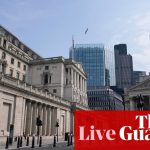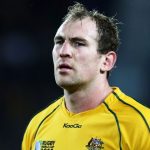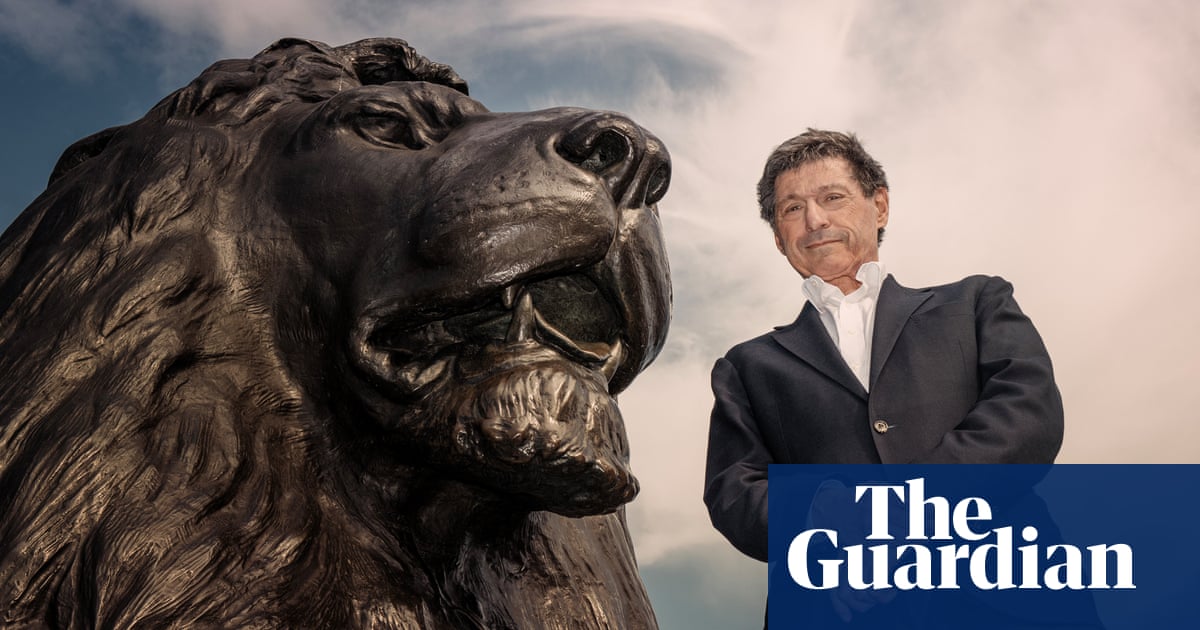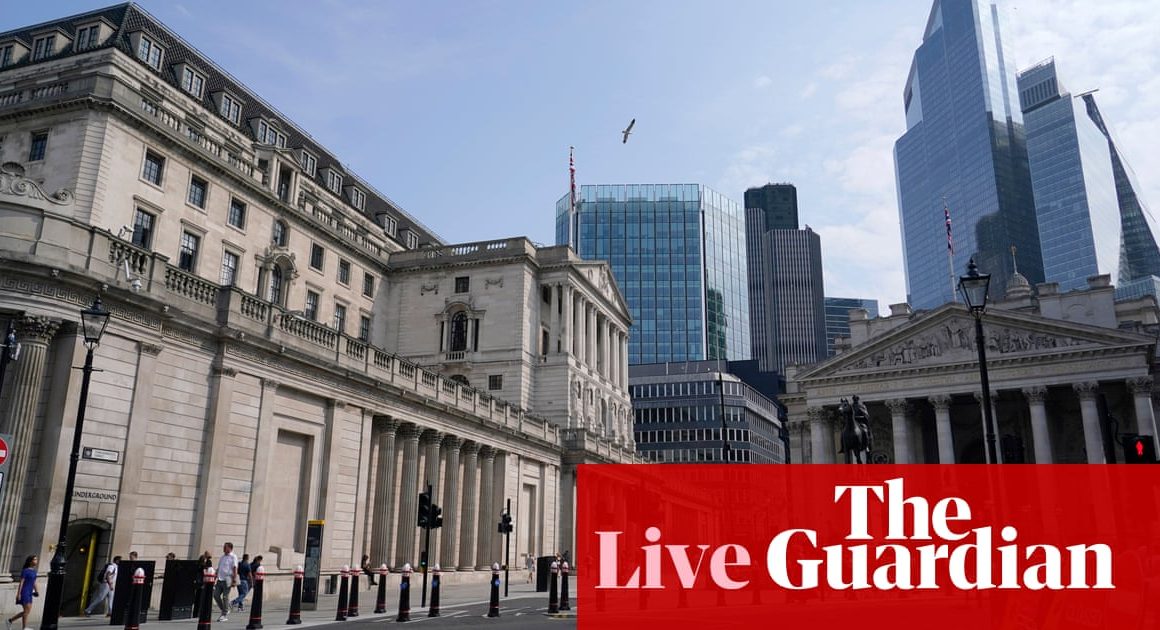When Jon Sopel left London in 2014 for Washington DC, to become the BBC’s North America editor, everything seemed fairly stable. “The boring coalition with Clegg and Cameron, who didn’t seem that different as people,” he remembers. “Brexit was not even a glimmer.” Nor was the rest of the turmoil to come: Boris Johnson, the pandemic, Liz Truss, even Donald Trump in the US. When Sopel moved back in 2022, the country felt completely different – “like a nervous breakdown”, he says, and eerily unfamiliar. Trying to get his head around it all has resulted in a book, Strangeland: How Britain Stopped Making Sense.
“It was quite triggering to write,” he says with a small laugh, “just thinking how crazy it was.” Same here – I had wiped the words “tractor porn” from my mind until Sopel’s reminder in a chapter about the worst of our MPs (this is Neil Parish who was forced to resign in 2022 after being caught accessing explict material in the House of Commons).
It’s late morning in a hotel bar, Sopel is warm and engaging – as listeners of the hit podcast The News Agents he presents with Emily Maitlis and Lewis Goodall will know – and looking like an off-duty centrist dad in jeans and oatmeal sweater. Is he a centrist dad? (At 65, Sopel is also a grandfather.) “I suppose centrist sounds vaguely pejorative and dull.” Anyway, pigeonholing, he says, is “really idiotic. There are some things where I would be classed as left of centre, other things I’d be classed right of centre.” He prefers to describe himself as “questioning”.
For a book about Britain, a huge amount of it focuses on the US, and the shockwaves since Trump’s 2016 victory. Isn’t the US very different from the UK? “It is,” he says, “but America does things, and we copy. No, we’re not as divided as a society, thank God, but I look at some of the dialogue that takes place on social media, the intolerance, or just a lack of willingness to hear an alternative argument.” Sopel was shocked by the Capitol riot in January 2021, fuelled by Trump’s false claims that the election had been rigged. It made him think, he says, “How safe are the institutions that I’ve grown up with all my life?”
Is it not rather a leap to suggest that could happen here? “It could have been very different – if Trump had been a little better organised, if there was more discipline, if three or four people hadn’t done the right thing. You realise that so much of our democracy relies on people behaving decently and properly.” In the UK, he adds, “Boris Johnson had no interest in behaving properly or decently. He was eventually muscled out, but there could have been people who wanted to indulge him more. You don’t want to keep stress-testing our institutions to destruction.”
Sopel left the BBC in 2022, after nearly 40 years. He says he was being lined up to become the BBC’s political editor, but realised he didn’t want it. “There was a laziness [on my part]. Do I want to be outside Downing Street at quarter past 10 on a wet November night, and then doing it all again at six the next morning for the Today programme?” And, he adds, “I had concerns about whether I would be able to do it the way I wanted to do it.” It was Maitlis, with whom he presented the BBC’s Americast podcast, who suggested they take their chemistry and insight to commercial podcasting. “I just thought, why not? If I’m not going to do it now, I’m never going to do it.” Neither regret it, he says. How much do they pay him? “Lots,” he says with a laugh. Do he and Maitlis earn the same? No idea, he says. They haven’t talked about it? “Not really.”
He describes having been institutionalised by the BBC – he had never bought a mobile phone, or a laptop. “If I had any problem, I rang tech support. My daughter pointed out that she’s had more employers than I have. It was like the prison doors opened; it took a while to adjust to being on the outside.”
It was at the University of Southampton, where he was president of the students’ union, and a friend was reporting for local radio on the warships leaving Portsmouth for the Falklands, that Sopel became fascinated by journalism: “It just seemed weird that a fleet was going to set sail, like something out of Nelson’s time.” He joined the BBC’s local radio station there in 1983. “I still don’t know what else I’d have done. I still love the thrill,” he says.
Sopel and his sister grew up at the Bernhard Baron settlement in east London, a huge building that included gyms, halls, a basement synagogue and rooftop play area for the large local Jewish community. His parents, both social workers, were also the wardens. It sounds an extraordinary place to live.
“It was,” says Sopel. “Obviously, when you’re in the middle of it and you’re being brought up there, it just seemed normal.” It had been set up in 1914 to turn new Jewish immigrants into, writes Sopel, “upstanding British citizens and patriots”. Perhaps it’s no wonder that six decades after he left the place, Sopel is still thinking about what it means to be British. “I think it’s a pride in the country. It’s about long, complicated history. It’s tolerance, irony, it’s a sense of humour, which I missed in America. I do not think that Britishness is about wearing union jack cufflinks and socks and posting pictures of a full English breakfast and saying, ‘When will I be banned from having that?’”
When he was 11, the family moved to Finchley, north London. His grandparents on both sides had fled Europe – from Poland and Russia. Did he grow up with a sense of his family’s persecution? “You know, every Jewish festival under the sun is a miserable kind of recollection of where we’re fleeing from,” he says with a wry smile. “So you’re aware of that, you’re aware of the second world war. But did I grow up conscious of being other? I didn’t really. It wasn’t until I joined the BBC, actually, and I was at the local radio station and some people seemed to find it exotic that I was Jewish, like they’d never come across a Jew before.”
There has been a huge rise in antisemitism. Has he experienced it? “I mean social media … but social media is a sewer. I don’t know whether these people are even real, whether it’s bots, or the algorithm promoting divisive comment.”
He worries about the rise of anger and intolerance, and the rise of the Reform party. “[They] are now in second place in 90 Labour seats … a lot of their grassroots support are even further to the right. You’ve got a Tory leadership contest where the party members [who will vote] are way to the right, much closer to Reform. So is the Tory party going to become a far-right, anti-immigrant party?”
Sopel finished his book before the riots in the summer. “There is unease, and there are people who want to take the law into their own hands, and there is some serious intolerance.” But he thinks it’s partly that the narrative on immigration has been so badly handled by politicians and the mainstream media, either on purpose or by well-meaning liberals. “What do I think about illegal immigration? It’s totally unacceptable. But there’s a lot of migration that contributes massively towards the economy and the UK.”
He is alarmed by “the decline of mainstream news”, and the rise of conspiracy theories – another thing he was surprised by when he came back to the UK. “I couldn’t believe how suddenly we’re embracing conspiracy theory – that just doesn’t feel like who we are. That’s a really alarming development, and it needs challenging.” With the people who feel alienated from power, he can almost understand it. “But when you get Liz Truss being the author of conspiracy theories [she blamed the “deep state” for her short-lived premiership],” he says, voice rising, “you think, ‘You are the establishment – what on earth are you talking about?’”
The News Agents – which is recorded around lunchtime, and aims to drop by 5pm on weekdays – has hit 100m downloads, and, depending which chart you look at, is usually in the top five podcasts. The team has just announced a first live show, at the Royal Albert Hall in London, political podcasters being like rock stars these days. Does he feel like a celebrity journalist now? “No! What does that mean anyway?” He knows what it means, I say (he’s trying to look mock indignant and modest, not entirely successfully). “I love the word veteran being attached to me. Christ, you’re so bloody old.” He smiles. “I’m just a hack following a story, and the adrenaline still flows when you’re on to a good story.”
Launched with much hype in 2022, The News Agents has brought Sopel a new audience. Just this morning, he was stopped as he walked his dog, by a young man out running. Didn’t he have that at the BBC? “I was popular with an older cohort, not younger ones.” Even so, The News Agents is one of a number of what the Guardian has called “dadcasts”, and what the Spectator described as the “rise and rise of the centrist bore podcast”. Chief among these is The Rest Is Politics, hosted by Alastair Campbell and Rory Stewart, but others, including Ed Balls and George Osborne’s Political Currency, have tried to get in on the boom. Becoming a podcast host is one way to launder reputations (I’m thinking of Osborne in particular, a man whose policies wreaked so much devastation on the most vulnerable). “Yeah, and people will try to do that – Farage going on I’m a Celebrity … Get Me Out of Here! Politicians have always tried to show their human side, to seem more engaging or authentic. But you can’t just make yourself authentic.”
Should Balls, the former Labour MP and shadow chancellor, now presenter on the ITV show Good Morning Britain, be interviewing Yvette Cooper, the home secretary, and his wife? “No, that’s ridiculous, that was preposterous.” We talk about whether the relationship between Westminster and journalists has become too cosy – and I point out he attended Osborne’s wedding last year. Does that not put him in a difficult position with the former chancellor? “No, because do you know why I went to George Osborne’s wedding?” says Sopel, suddenly combative. Because he’s friends with Osborne’s wife, Thea Rogers, a former BBC producer. “What would it say about friendship if you said, ‘I’m not coming to your wedding, even though you’re a dear friend, because you’re marrying a politician, it will look too cosy’? I think that would make me look utterly shallow.”
The July general election has been described as the “first podcast election” , seeing a boom in listening figures for political podcasts. Sopel thinks it’s because podcasts reach younger people especially, and they can cover the news in a different, more accessible way than, say, the Today programme. Should podcasts be regulated by Ofcom, particularly ones with a certain number of listeners or those claiming to be news? “I have no fear of it – it’s something that may come.”
Sopel sees strong benefits from being unleashed from BBC impartiality rules, though. During the Brexit campaign, he was covering then-president Barack Obama’s visit to the UK. He was told by his BBC bosses to add something in, incongruously, about Nigel Farage, simply for “balance”. He did, but says, “I emailed people about it afterwards and said, ‘I think this is crazy, we’ve got this wrong.’ Was it impartial to do ‘some say this, some say that, only time will tell who’s right’? If something is untrue and is demonstrably untrue, why don’t we say it’s untrue? Otherwise, how are we helping the listener, the viewer, to understand? Doing the podcast, we’ve got a lot more freedom.”
The BBC seems to be in crisis, not least because of the recent conviction of Huw Edwards, its news anchor, who pleaded guilty to making indecent images of children. Last year, Sopel defended Edwards several times, on TV as well as on his podcast, before the full criminality of his behaviour had been revealed. Did Edwards ask him to do that? “No, he didn’t ask me to do anything. I’ve known Huw a long time, but we weren’t mates, hadn’t seen each other socially.” At the time, he stresses, “the police came out and said there was nothing to it. I thought, if there’s nothing to it and he sent a couple of inappropriate texts, he’s just got a complicated private life.” That turned out to be way off the mark, but Edwards’s conviction wasn’t related to those initial allegations. “You do what you do for the right reasons,” says Sopel. “I’m not going to defend anything that he’s done. It’s absolutely abhorrent.”
The BBC is commissioning an independent review of its workplace culture, and its licence fee remains under threat. The funding model, thinks Sopel, “is fundamentally broken, but I do think the BBC is our most fantastic cultural institution and an absolute jewel in the crown, compared to what is in America, or what GB News would like to do.”
An optimistic, if naive, view is that after the chaotic period detailed in Sopel’s book, perhaps things are more settled now, and may even – please – improve. For all his freebies, Starmer surely isn’t anything like as self-serving as Johnson, or as reckless as Truss? But Sopel remains wary. In the US, he thinks Kamala Harris “is marginally ahead”, but points out it’s “going to be on a knife edge. I wouldn’t bet the house on it.” His view is that we can’t be complacent about the things we’d really be better off keeping, whether it’s the BBC or democracy itself. “This is not to catastrophise,” he says, “but if you look at the great sweep of history, liberal democracy is the exception, rather than the rule, and you’ve got to guard it. When you see forces at play that are undermining democracy, that causes me some anxiety.”










